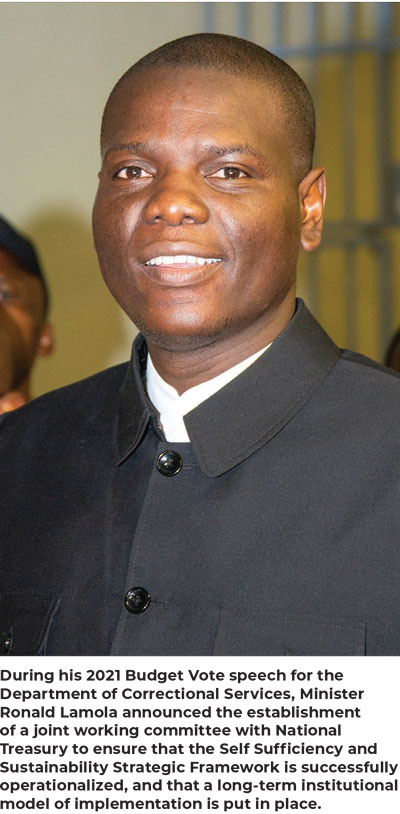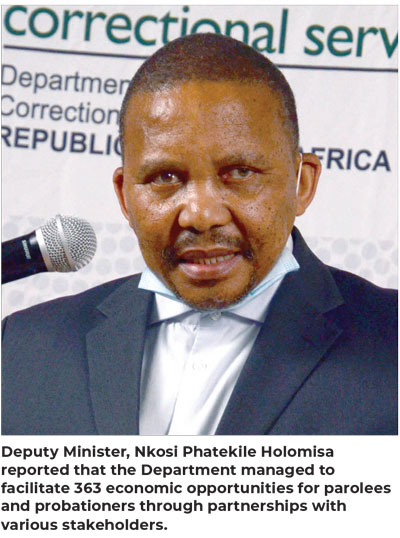 In response to fiscal constraints and consequent budget cuts, Minister Ronald Lamola announced that the Department of Correctional Services (DCS) will implement the Self Sufficiency and Sustainability Strategic Framework. He outlined this plan during the DCS 2021 Budget Vote debate on Thursday, 20 May 2021, and said this initiative is aimed at developing and utilising state assets under the Department, to reduce the costs incurred by the fiscus, and to generate revenue for the Department. “I have no doubt that self-sufficient correctional centres can truly be a catalyst for the innovative use of government funds,” said Minister Lamola.
In response to fiscal constraints and consequent budget cuts, Minister Ronald Lamola announced that the Department of Correctional Services (DCS) will implement the Self Sufficiency and Sustainability Strategic Framework. He outlined this plan during the DCS 2021 Budget Vote debate on Thursday, 20 May 2021, and said this initiative is aimed at developing and utilising state assets under the Department, to reduce the costs incurred by the fiscus, and to generate revenue for the Department. “I have no doubt that self-sufficient correctional centres can truly be a catalyst for the innovative use of government funds,” said Minister Lamola.
Minister Lamola enunciated that rehabilitation and correctional programmes implemented by the Department will now be geared towards ensuring that offenders spend their time in incarceration to contribute positively towards building the economy and communities. He said the implementation of the Self-Sufficiency and Sustainability Strategic Framework is already yielding positive results, with inmates and correctional officials working efficiently to produce more in various Correctional Facilities. As a result, the production levels in the farms, workshops and bakeries at various Correctional Centres across the country are increasing.
He commended the offender labour programme custodians, for producing 3 632 508 kilograms (kg) of vegetables, 218 095 kg of fruits, 676 369 dozens of eggs, 591 718 kg of poultry, 940 699 kg of pork, 3 150 990 litres of milk, 212 514 kg of beef, and 1 839 645 loaves of bread, for inmates’ allocation. Minister Lamola also postulated that by the end of the current financial year, there will be no pork and eggs that will be procured externally for the sustenance of inmates. He reported that the Department saved the government R94 million during the 2020/21 financial year.
The Department’s budget for the 2021/2022 financial year is R25, 2 billion, of which R6, 2 billion (24.6%), is allocated to Head Office. The remaining 75.4% of the budget is allocated to regions- 58% of which is allocated to Programme Incarceration and Corrections, followed by Administration (13.2%), Care (12%), Rehabilitation (10.6%) and Social Reintegration (6.2%). In an effort to ensure safe infrastructure and environment for both officials and inmates, the Department has set aside R1, 6 billion for Capital Works Programmes over the 2021/22 Medium Term Expenditure Framework (MTEF) period. R1, 1 billion will go towards the upgrading of facilities and additions, whilst R486, 1 million has been allocated for repairs and maintenance of correctional centres. The MTEF additional facilities will include Emthonjeni Youth Centre, Parys Centre, Brandvlei Centre, Burgersdorp Centre and Lichtenburg Centre.
Minister Lamola further expressed his gratitude to all healthcare professionals in Correctional Services, Management and all officials, for their immense and selfless contribution in the fight against the devastating COVID-19 pandemic. He also acknowledged the positive response of healthcare professionals for heeding the call to be vaccinated. He also encouraged those who are yet to take the vaccine to do so.

Deputy Minister, Nkosi Phathekile Holomisa, during the budget vote debate, highlighted the importance of partnerships and stakeholder relations, which assists the Department to render effective correctional services. “As government, we are alive to the importance of working with partners, stakeholders and civil society broadly. We maintain that corrections is a societal matter, and therefore, welcome all initiatives aimed at enhancing the work of the Department,” he said. As part of the Department’s Social Reintegration programme for parolees and probationers, the Department managed to facilitate 363 economic opportunities for parolees and probationers through partnerships with various stakeholders.
The Deputy Minister acknowledged receipt of a donation of business starter packs from Ekupholeni Mental Health Institute, in Gauteng, through their Economic Development Programme and partnership with DCS. These starter packs are worth R1 000 each and were donated to 18 parolees and probationers, with the aim to assist them to start their own small businesses such as car washes, spaza shops and welding among others.
He further commended the tremendous work done through a series of sessions with Heads of Centres, led by the National Commissioner, Arthur Fraser, in all the regions. The purpose of the sessions was to reinforce the call of going back to basics and to ensure consistency in the application of Departmental policies and procedures across all centres, by Heads of Centres and Area Commissioners, as well as to capacitate them with the tools of trade, to ensure a uniformed execution of duties.
Deputy Minister Holomisa further enunciated that keeping Correctional Facilities clean, treating those incarcerated with dignity and respect, and allowing them a reasonable second chance within the confines of our correctional centres is a noble cause. “Our objective is to turn the tide and have Correctional Centres that work for our people, thereby ensuring safer communities,” concluded Nkosi Holomisa.
